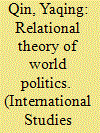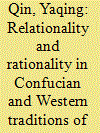|
|
|
Sort Order |
|
|
|
Items / Page
|
|
|
|
|
|
|
| Srl | Item |
| 1 |
ID:
103996


|
|
|
|
|
| Publication |
2011.
|
| Summary/Abstract |
The development of International Relations theory (IRT) in China has been framed by three debates since 1979. The first was about China's opening up to the outside world. It started with the question of whether the world was characterized by 'war and revolution' or 'peace and development' between orthodox and reformist scholars and continued to focus on China's interest between orthodox scholars and the newly rising Chinese realists. It resulted in a wide acceptance of the reformist argument that peace and development characterized our era and of the realist view that China was a normal nation-state and should have its own legitimate national interest. The second started in the early 1990s and centered on the better way of realizing China's national interest. It was between Chinese realists and liberals. While the former emphasized national power, the latter proposed the alternative approach of international institutions. The third debate was on China's peaceful rise. It evolved at the turn of the century, when all the three major American IRTs, realism, liberalism, and constructivism, had been introduced into China and therefore the debate was more a tripartite contention. Realists believed that it was impossible for any major power to rise peacefully, while liberals and constructivists both supported the peaceful-rise argument. Liberals stressed more the tangible benefits derived from international institutions and constructivists explored more China's identity in its increasing interaction with international society. Although it was Chinese constructivists who explicitly discussed the identity issue, all the three debates and all the debating sides have reflected this century puzzle since the Opium War - China's identity vis-à-vis international society. These debates have helped push forward the IRT development in China and at the same time established Western IRT as the dominant discourse. A new round of debate seems likely to occur and may center on the question of the world order. This time it may help the newly burgeoning but highly dynamic Chinese IRT to develop and contribute to the enrichment of IRT as knowledge of human life.
|
|
|
|
|
|
|
|
|
|
|
|
|
|
|
|
| 2 |
ID:
162637


|
|
|
|
|
| Summary/Abstract |
This article develops a cultural approach to international theorizing. It argues that a cultural community is the prototype of a community of practice and where, therefore, shared background knowledge plays a significant role in knowledge production and theoretical innovation, because theorists are cultural beings sharing the background of the community in which they live and practice. Social theory, thus, bears the indelible cultural imprints of that community. It correctly aims to be universal but can at best achieve bounded universality. Two cases are used to illustrate the cultural approach: the ‘implicit permeation’ typical of Western (international relations) international relations theories, which are inspired by key elements of Western culture, history, and practice and the ‘explicit penetration’ of Chinese IR theories, which rely explicitly on Chinese cultural resources for information and enlightenment. Three Chinese IR theories—Yan Xuetong’s moral realism, Zhao Tingyang’s Tianxia system, and Qin Yaqing’s relational theory—are discussed as specific examples. The cultural approach is both essential and effective for the development of non-Western IR theories. Taking a pluralistic approach, the article also argues for the recognition of a multiverse of knowledge and for the encouragement of non-Western IR theories to grow and engage Western IR theories in a constructive dialog toward reciprocal empowerment. A significant development upon the discipline’s centenary would, perhaps, be the rise of a truly global IR project whose hallmark is the growth of non-Western IR theories.
|
|
|
|
|
|
|
|
|
|
|
|
|
|
|
|
| 3 |
ID:
145118


|
|
|
|
|
| Summary/Abstract |
Culture matters in social theory construction because the metaphysical component of the theoretical hard core is primarily shaped by the background knowledge of a cultural community. Individual rationality, a key concept abstracted from Western culture, constitutes the nucleus for much of mainstream Western International Relations Theory. This article proposes a relational theory of world politics with relationality as the metaphysical component of its theoretical hard core. It conceives the International Relations (IR) world as one composed of ongoing relations, assumes international actors as actors-in-relations, and takes processes defined in terms of relations in motion as ontologically significant. It puts forward the logic of relationality, arguing that actors base their actions on relations in the first place. It uses the Chinese zhongyong dialectics as its epistemological schema for understanding relationships in an increasingly complex world. This theoretical framework may enable us to see the IR world from a different perspective, reconceptualize key elements such as power and governance, and make a broader comparison of international systems for the enrichment of the Global IR project.
|
|
|
|
|
|
|
|
|
|
|
|
|
|
|
|
| 4 |
ID:
168764


|
|
|
|
|
| Summary/Abstract |
This paper provides a theoretical sketch of relationality within the field of International Relations (IR). It argues, contrary to what many IR scholars hold, that representation is practice: academic representation reflects the background of a community of practice and highlights what is embodied therein. Therefore, different cultural communities have different practices and draw from different background knowledge. Rationality, which serves as the dominant foundation for background knowledge within many Western communities of practice, permeates mainstream IR theory. Relationality performs a similar role in traditionally Confucian communities of practice, where relations enjoy a distinct ontological status over individual rationality. A relational theory assumes (1) that self-existence coincides with other-existence and coexistence, and (2) that self-interest coincides with other-interest. Based on these assumptions, it argues that relations select, meaning that in a social situation actors base their action on relations in the first place and that rationality is and can only be defined in terms of relations. The article uses the Association of Southeast Asian Nations (ASEAN) as an example to elaborate its theoretical point.
|
|
|
|
|
|
|
|
|
|
|
|
|
|
|
|
| 5 |
ID:
106043


|
|
|
|
|
| Publication |
2011.
|
| Summary/Abstract |
In International Relations, the question of global governance has become a main issue that has given rise to numerous research programs and products on the question of how to govern. IR scholarship, however, has more or less been conducted according to the tradition of regime and institution studies, focusing on how rules govern and how institutions can promote cooperation by lowering transactional costs and reduce conflict by increasing predictability and decreasing uncertainty. 1 In the IR discourse, rule-based governance seems to be the only model at international, regional, and global levels.
|
|
|
|
|
|
|
|
|
|
|
|
|
|
|
|
|
|
|
|
|